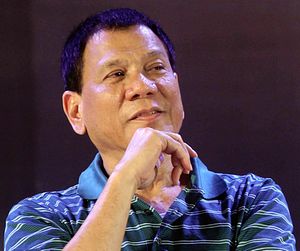Philippine President Rodrigo Duterte promised an end to military exercises with longtime ally the United States today. Speaking from Hanoi, Vietnam, Duterte said that he was “serving notice now to the Americans” that an upcoming drill “will be the last military exercise.” That’s likely to come as a shock to U.S. officials, who have routinely insisted that, behind Duterte’s rhetoric, U.S.-Philippine cooperation is progressing as normal.
Earlier this month, Duterte ordered U.S. Special Forces assisting Philippine troops in counterinsurgency operations in Mindanao to leave. He later walked back those comments, explaining, “I didn’t say [U.S. forces] have to leave immediately… I never said, ‘Get out of the Philippines,’ for after all, we need them there in the [South] China Sea.”
That last part is especially interesting, as Duterte has given little indication that he wants U.S. help in the Philippines’ maritime disputes with China. In his remarks in Hanoi, in fact, Duterte made it clear that he is not interested in conducting joint patrols with Washington in the South China Sea. Whereas his predecessor, Benigno Aquino, cleaved close to the United States in the face of increasingly assertive Chinese behavior in waters also claimed by Manila, Duterte dismissed the idea of a Philippine-Chinese conflict as “imaginary.”
Instead, Duterte has actively courted China, downplaying the territorial disputes in the face of economic potential. Earlier this week, Duterte vowed to “open alliances with China” and Russia, saying the Philippines under his leadership would increase ties with the “other side of the ideological barrier.” He added that he was “ready to not really break ties” with Washington, but also said that the U.S.-Philippine relation was at the “point of no return.”
China, unsurprisingly, has welcomed Duterte’s overtures. “Huge differences or not, as long as China and the Philippines maintain the political willingness to resolve problems, there will be no insurmountable obstacles in the development of bilateral relations,” Foreign Ministry spokesperson Lu Kang told reporters on September 23.
Yet concrete progress on ties has been slow, perhaps because Duterte himself seems unsure of what he wants when it comes to foreign policy.
As an example, even as Duterte talked up relations with Beijing, his special envoy to China, former President Fidel Ramos, canceled a planned trip this week. Ramos, who was tasked with smoothing China-Philippine ties after an arbitral tribunal ruled in Manila’s favor on its South China Sea case, previously took an unofficial, ice-breaking trip to Hong Kong.
The Philippine embassy in China posted a notice on its website on September 26, inviting “the Filipino community to a gathering” on September 28 with Ramos, who would “be in Beijing for an official visit.” The very next day, however, the embassy posted another notice, saying the event had been called off. “The trip to China of former President and Special Envoy Ramos has been canceled,” the embassy said, without providing any explanation as to why.
Reuters, citing an unnamed aide to Ramos, said the special envoy would still visit China at “the proper time.” Another source told Reuters that Ramos’ visit was canceled because it would conflict with Duterte’s own trip to Vietnam this week. The same source said that Duterte’s “visit to a number of Asian countries is being arranged.”
Whether his itinerary will include China remains to be seen. Japanese media have reported that the Philippine president will pay separate visits to both China and Japan in October, but neither Manila nor Beijing has confirmed the reports. It’s general diplomatic protocol for another official – in this case, likely Ramos – to visit a foreign country first, to pave the way for a presidential visit. If and when Ramos does go to China, it will be a good indication to watch for Duterte’s own trip.
In a press conference on Tuesday, Chinese Foreign Ministry spokesperson Geng Shuang declined to confirm a presidential visit, but told reporters, “We have expressed our welcome to President Duterte’s visit on many occasions. We hope that he can make this trip as soon as possible.” He added that China and the Philippines “are in close communication on this.”
If Duterte does make a trip to China next month, that could very well mean he will have a formal meeting with his Chinese counterpart, Xi Jinping, before holding a formal sit-down with U.S. President Barack Obama. A scheduled meeting between Duterte and Obama on the sidelines of the ASEAN Summit in Laos was canceled after Duterte made disparaging remarks about the U.S. leader. Meeting Xi first would be another splash of cold water on the U.S.-Philippines alliance.

































